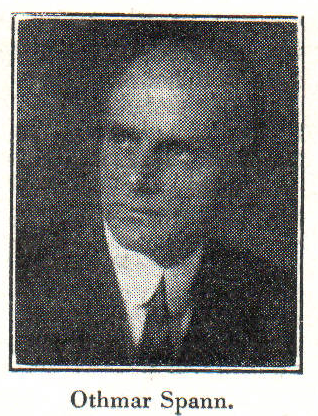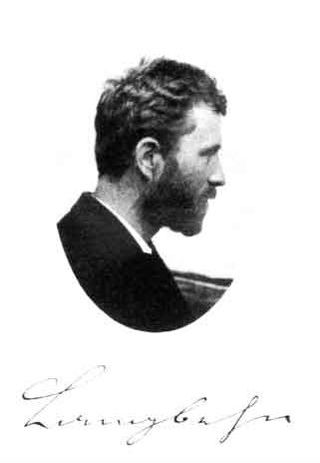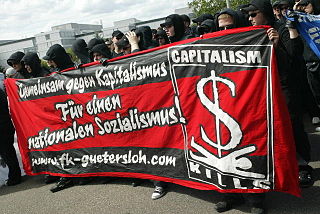Related Research Articles

Othmar Spann was a conservative Austrian philosopher, sociologist and economist. His radical anti-liberal and anti-socialist views, based on early 19th century Romantic ideas expressed by Adam Müller et al. and popularized in his books and lecture courses, helped antagonise political factions in Austria during the interwar years.

Juli Zeh is a German writer and former judge. She is known for novels such as The Method (2009), Unterleuten (2016) and About People (2021).

Ernst Nolte was a German historian and philosopher. Nolte's major interest was the comparative studies of fascism and communism. Originally trained in philosophy, he was professor emeritus of modern history at the Free University of Berlin, where he taught from 1973 until his 1991 retirement. He was previously a professor at the University of Marburg from 1965 to 1973. He was best known for his seminal work Fascism in Its Epoch, which received widespread acclaim when it was published in 1963. Nolte was a prominent conservative academic from the early 1960s and was involved in many controversies related to the interpretation of the history of fascism and communism, including the Historikerstreit in the late 1980s. In later years, Nolte focused on Islamism and "Islamic fascism".

Udo Konstantin Ulfkotte was a German journalist and author who worked for the German main daily newspaper Frankfurter Allgemeine Zeitung (FAZ) from 1986 until 2003. From the end of the 1990s, he wrote several bestsellers and increasingly advocated right-wing populist, Islamophobic, and conspiracy-theory positions, and maintained that journalists, including himself, and leading newspapers published material that had been fed to them, or bought, by the CIA and other Western intelligence and propaganda agencies.

Julius Langbehn was a German national Romantic art historian and philosopher. He was born in Hadersleben, Schleswig, and died in Rosenheim.
Gerald Steinacher is Professor of History and Hymen Rosenberg Professor of Judaic Studies at the University of Nebraska-Lincoln. After serving at the South Tyrolean Regional Archives in Bozen, he was a Joseph A. Schumpeter Research Fellow at Harvard University during 2010-2011 and in 2009 a visiting scholar at the Center for European Studies at Harvard University. He lectured at the Universities of Innsbruck (Austria), Luzern (Switzerland) and Munich (Germany). In 2006 he was a Center for Advanced Holocaust Studies Fellow at the United States Holocaust Memorial Museum in Washington, DC.

Autonome Nationalisten are German, British, Dutch, and to a lesser degree Flemish, nationalists, who have adopted some of the far-left and antifa's organizational concepts, demonstration tactics, symbolism, and elements of clothing, including Che Guevara T-shirts and keffiyehs. Similar groups have also appeared in some central and eastern European countries, beginning with Poland, the Czech Republic, Ukraine, Romania and Greece and others.
Anton Maegerle is the Pseudonym of the German journalist Gernot Modery. He is also the author of books about far-right politics, right-wing radicalism, the New Right, and right-wing policy in general.
Politically Incorrect is a mainly German-language counter-jihad political blog which focuses on topics related to immigration, multiculturalism, and Islam in Germany and Western societies. A condensed version of the weblog is available in English. The blog is one of the oldest German far-right sites, which has been spreading hate speech against Muslims and migrants in Germany. The content is amplifying the fear of Islam.
Clemens-Brentano-Preis of the city of Heidelberg is a literary prize of Germany. It was established in 1993, and named after the German poet Clemens Brentano (1778–1842). The prize money is €10,000.

Kopp Verlag is a German publisher based in Rottenburg am Neckar. It publishes books and an online news website notably in the field of right-wing esotericism, populism and extremism, as well as pseudoscience and conspiracy theories. Other topics include wellness, outdoor equipment, survival skills and self-defense.

Götz Kubitschek is a German publisher, journalist and far-right political activist. He espouses ethnocentric positions and is one of the most important protagonists of the Neue Rechte in Germany. Hailing from the staff of right-wing newspaper Junge Freiheit, Kubitschek is one of the founders of the Neue Rechte think tank Institut für Staatspolitik. Since 2002, he is the manager of his self-founded publishing house Antaios, since 2003 chief editor of the journal Sezession, as well as editor of the corresponding blog Sezession im Netz.

Christoph Butterwegge is a German political scientist and poverty researcher. From 1998 to 2016 he was Professor of Political Science at the Institute for Comparative Education and Social Sciences at the Humanities Faculty of the University of Cologne and is a member of the Research Center for Intercultural Studies (FiSt).
Helmut Roewer is a German lawyer and author. He served between 1994 and 2000 as president of the regional office for protection of the constitution in Thuringia. This is a state-level security agency. Controversy in respect of his time in office has persisted, although he himself robustly rejects most of the criticisms of his decisions made at that time.

Kevin Kühnert is a German politician and the General Secretary of the Social Democratic Party of Germany (SPD) who has been serving as a member of the Bundestag since the 2021 elections, representing Berlin-Tempelhof-Schöneberg.
Antifa is a political movement in Germany composed of multiple far-left, autonomous, militant groups and individuals who describe themselves as anti-fascist. According to the German Federal Office for the Protection of the Constitution and the Federal Agency for Civic Education, the use of the epithet fascist against opponents and the view of capitalism as a form of fascism are central to the movement. The antifa movement has existed in different eras and incarnations, dating back to Antifaschistische Aktion, from which the moniker antifa came. It was set up by the then-Stalinist Communist Party of Germany (KPD) during the late history of the Weimar Republic. After the forced dissolution in the wake of Machtergreifung in 1933, the movement went underground. In the postwar era, Antifaschistische Aktion inspired a variety of different movements, groups and individuals in Germany as well as other countries which widely adopted variants of its aesthetics and some of its tactics. Known as the wider antifa movement, the contemporary antifa groups have no direct organisational connection to Antifaschistische Aktion.
Compact is a German magazine. Compact is the most important popular magazine of the extreme far-right in Germany. It unites different political milieus through strategic topic setting.

Gerald Lembke is a German business economist with focus on digital media and non-fiction author.

Gertrud Höhler is a German literary scholar, management consultant and political consultant.
Gabriele Kämper is a German literary scholar and head of the Equality Office of the Berlin Senate.
References
- ↑ Amerikastudien/American Studies, Vol. 63.1/2018, Deutsche Gesellschaft für Amerikastudien
- ↑ Strick, Simon (2022-12-02). "Warum die transfeindliche Debatte einfach nicht verstummt". Der Spiegel .
- ↑ "Dr. Simon Strick". ZEM. Retrieved 24 April 2023.
- ↑ "Simon Strick erhält Hans-Bausch-Mediapreis". John-F.-Kennedy-Institut. Retrieved 2022-12-08.
- ↑ "Kulturwissenschaftler über digitalen Rechtsruck: 'Faschismus kommt als Schwarmbewegung von unten wieder'". Der Spiegel . 8 August 2021.
- ↑ Ingo Arend (2 August 2021). "Simon Strick: "Rechte Gefühle". Wie der "digitale Faschismus" Emotionen manipuliert". Deutschlandfunk Kultur .
- ↑ Arme weiße Männer: Wie man die Mehrheitsgesellschaft als unterdrückte Minderheit inszeniert: der Medienwissenschaftler Simon Strick über den Erfolg rechter Gefühlsformeln, Frankfurter Allgemeine Sonntagszeitung, 26 September 2021, p. 38.